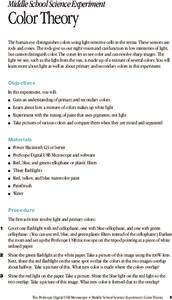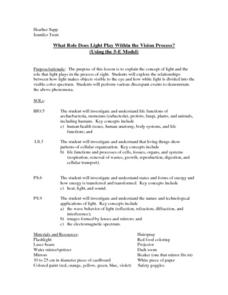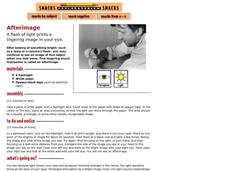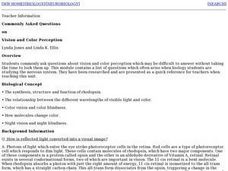California Academy of Science
Color Vision Genetics Evolution Simulation
At one point, all mammals carried only two color receptors, but now most humans carry three. An informative presentation and hands-on activity demonstrate how this evolved through genetics. By participating in the activity, pupils...
PHET
Color Vision
Humans can only see visible light, but some insects can see ultraviolet light. Through a simulation, pupils explore how we see colors using one bulb. It moves on to demonstrate how we see colors by mixing three different bulbs (red,...
Curated OER
Light 3: All Those Seeing Color, Say Eye!
Young scholars explore the nature of light. They use on-line articles and a worksheet to explore the roles of the eye and brain in the perception of color. They draw and label a diagram illustrating the movement of light.
Curated OER
The Lighter Side of Color
Middle schoolers explore light and color, including how colors are mixed to produce new colors, how light is filtered, and how light is reflected off of surfaces. They read materials provided, complete worksheets, and complete hands-on...
Curated OER
Light, Colors, and Vision
Third graders experience optic illusions by creating flipbooks. In this optics lesson, 3rd graders view a demonstration of the workings of rods and cones using a camera. They are shown an optical illusion and work to create their own...
LABScI
Vision Lab: The Eye
Our bodies have some amazing capabilities, but there are some limitations. Explore the limitations of the human eye through the eighth lab activity in a series of 12 biology lessons. Individuals measure their own peripheral vision...
Howard Hughes Medical Institute
Human Skin Color: Evidence for Selection
Skin color is controlled by at least six genes. Young scientists learn about skin colors through a documentary. They discuss the topics of pigment, natural selection, and vitamin D absorption. They apply their knowledge to higher order...
Exploratorium
Bird in the Cage
When your life science class is learning about the eye and how it works, you can add this activity as a demonstration of how the retina holds an afterimage. After staring at a red, green, or blue bird shape, pupils glance at a cage and...
Curated OER
Color and Spectrum
Students examine the spectra of light sources that have similar colors. In this light lesson students complete an activity using various lights in the classroom and discuss the colors and the heat generated.
Nuffield Foundation
Investigating How We See Colour
Can you eyes be fooled into seeing colors that aren't actually there? Budding scientists view a presentation that addresses this topic. They explore how their eyes interpret color through the retinas and messages sent to the brain. They...
Curated OER
Light 2: The Lighter Side of Color
Students explore light and color, including how colors are mixed to produce new colors, how light is filtered, and how light is reflected off of surfaces.
Curated OER
Bioluminescence 2009: Living Light on the Deep Sea Floor Expedition - Now You See Me, Now You Don't
Young scholars examine bioluminescence and camouflage of deep sea creatures. In this deep sea creatures lesson, students investigate the visible and near-visible light spectrum. They work in small groups to complete a light, color, and...
Curated OER
Alternate Theory of Color Perception
Students use the color wheel, matches, masking tape, and slides to view an alternate theory of color perception. In this color perception lesson plan, students discuss the different theories and processors.
Curated OER
Newton's Color Wheels
Students investigate the effects of light while experimenting with several color wheels. They make observations and record them. The information from the observations is used to help fuel the discussion that follows. The instructional...
Curated OER
All Those Seeing Color, Say Eye!
Young scholars research and discuss the roles of the eye and brain in the perception of color. They watch a slideshow and complete a worksheet.
Curated OER
In Living Color
Students explore, through discussion and experimentation, colorblindness and how the color of the light passing through the eye changes how different colors are perceived.
Curated OER
Color Theory
Students are able to gain an understanding of primary and secondary colors. They are able to explore about how a mixture of colors makes up white light. Students are able to experiment with the mixing of paint that uses pigments, not...
Exploratorium
Pixels, Pictures, and Phones
Take a real close look at your phone screen. What do you see? Here's an activity that provides guidance on how to look at a smart phone screen in order to see the pixels and to see how the phone creates colors and motion on the...
Curated OER
Now You See Me, Now You Don't
Bioluminescence fascinates most upper elementary scientists. Display images of different glowing deep-sea organisms and discuss their environment. Young biologists then experiment with images and different colors of filtered light. In...
Curated OER
What Role Does Light Play Within the Vision Process?
Students are introduced to the relationship between light and vision. In groups, they participate in experiments to discover how different wavelengths are divided in the visible spectrum. They record their answers and discuss their...
Exploratorium
Afterimage
To illuminate how afterimage occurs, create a star, square, or other geometric-shaped light for learners to look at for 30 seconds. Then, have them explain what they see as they shift their focus to a blank wall. A full explanation of...
Curated OER
Colors, Computers, and Math Student Worksheet 1
In this color worksheet, students answer questions involving the visible spectrum. These eleven short answer questions involve wavelength, lux, and the effects of color on mood.
Curated OER
All Those Seeing Color, Say Eye!
Pupils discuss feelings and explore how to recognize how they are feeling. In this exploratory lesson students discuss conflict and ways to resolve problems.
Curated OER
Commonly Asked Questions on Vision and Color Perception
Young scholars commonly ask question about vision and color perception which may be difficult to answer without taking. They use this module that contains a list of questions which often arise when biology students are studying the...

























